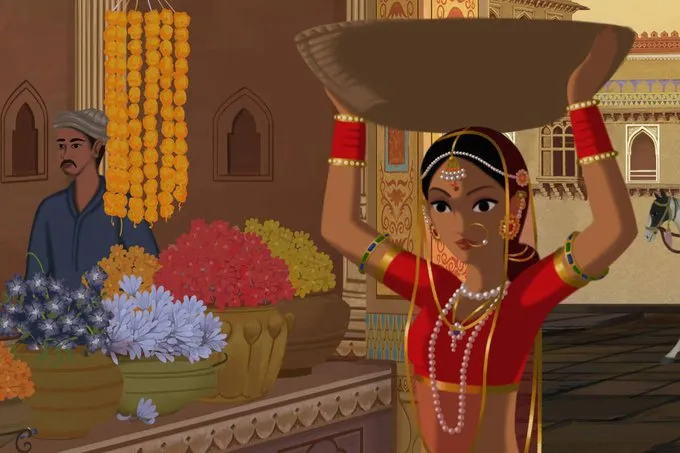Gitanjali Rao’s Bombay Rose is an animated masterpiece
Featuring Cyli Khare and Amit Deondi in the lead roles, Bombay Rose released on Netflix on March 8. The 97-minute animated film is written and directed by Gitanjali Rao.
Written and directed by Gitanjali Rao, Bombay Rose, is a story of longing, beautifully portraying the ‘Bombay’ of Mumbai.
Premiered at the International Critics Week for the 2019 Venice Film Festival, Bombay Rose released on Netflix on March 8, this year, way past its earlier scheduled date of December 4, 2020. It is produced by veteran businessman Anand Mahindra and Rohit Khattar.
The Indian film revolves around the lives of outsiders who come to Mumbai with hopes of living their dreams -- a story that is not new, but beautifully crafted. Bombay Rose tells stories of many Mumbaikars, but eventually revolves around the lives of two flower sellers -- a Hindu girl Kamala (Cyli Khare), and Muslim boy Salim (Amit Deondi). All the characters are connected by one flower -- the red rose.

Kamala is played by Cyli Khare | Source: Twitter
Largely a story of these two unconventional people coming together, Bombay Rose captures broader themes of child marriage, child labour, political upheavals persistent in Kashmir, and of hope.
Kamala is a child bride, rescued by her grandfather and now living with him and her little sister Tara. A flower seller by day, Kamala earns her bread by dancing at a bar in the evenings. She is worried about Tara’s future and wants to give her the means to lead a life that Kamala has only dreamt of.
Salim, on the other hand, is a refugee from Kashmir. He fled to Mumbai after his parents were shot dead by militants. Struggling to find work in the city, Salim takes to selling flowers on the streets. Like expected of most Bollywood films, the Muslim hero falls in love with the Hindu heroine. And like most Hindi films, this is when the villain enters.

Mike, the villain is played by Makarand Deshpande | Source: Twitter
Mike, as played by Swades actor Makarand Deshpande, is a pimp. He is in love (or so he says) with Kamala, and wants to sell her off to Dubai as a maid.
Salim perceives himself as a character played by film actor Raja Khan (Anurag Kashyap), and takes upon himself the responsibility to rescue Kamala from her misery. Salim is often seen longing for Kashmir, which he says has lost its ‘Heaven on Earth’ charm. He often dreams about his parents, and the only escape for him seems to be through Kamala -- the love of his life.
Kamala and Salim’s romance mostly exist in imagination.
The duo exchanges glances and flowers, but their conversations are restricted to just that. While Kamala is found escaping into a fairy land, wrapped in the arms of Salim; the hero keeps imagining himself with Kamala, living together in Kashmir.

Kamala and Salim, a scene from Bombay Rose | Source: Twitter
Their romance almost feels like a bed of roses, and they do become the escape for each other, but only for one rainy night in Mumbai. Their walk down the street, under one umbrella, almost reminds one of ‘Pyar Hua Ikrar Hua’ from Shree 420. Soon, the thorns aka villain Mike finds out about their blooming romance, and warns both the boy and the girl to end it. The hero decides to fight Mike, like the most cliched Bollywood actor.

The rainy night scene from Bombay Rose reminds one of Shree 420's 'Pyar Hua Ikrar Hua' | Source: Twitter
The fight scenes between Mike and Salim, and the action scene where the deaf and dumb child is chased by the police, almost seem real. Sometimes more than what is shown in Bollywood picture films.
Additionally, the audience is also introduced to prim and proper Miss D’Souza (Amardeep Jha), a former actress and a Christian widow who continues to live in the shadows of her dead husband. She finds her escape in 50s’ Bollywood songs, trinkets, charms and toys. Owner of an antique store, Anthony Pereirs (Shishir Sharma) is head-over-heels in love with Miss D’Souza, and has been consistent in trying to win her over.
The animated film is made frame-by-frame painted animation on the computer. It reportedly took 18 months and 60 artists to make the 97-minute film.
Director, writer, and editor Gitanjali Rao has done a brilliant job. The use of the monochrome palette perfectly fits Miss D’Souza’s mood and longing to live her youth again. Additionally, the reflection of Miss D’Souza on her mirror and of her younger self, conveys how she wants to go back into time and live her golden years with her husband.

Reflection of Miss D'Souza on her mirror revealed how the old lady yearned to go back into time and live her golden days | Source: Twitter
At many points, Bombay Rose will remind one of Gitanjali’s earlier project True Love Story (2014), a silent film about a flower-seller falling in love with a bar dancer. Much like the love story of Salim and Kamala.
The film's background score and the song ‘Rewa Nainon Mein Rahe’ guarantee to stay with the audience long after the film is over.
However, Bombay Rose does not share the same fate as that of other Bollywood love stories. There is death and moving on. But there is also the escape that every character in the film longs for.
Verdict: Do not miss Bombay Rose.
Edited by Teja Lele









